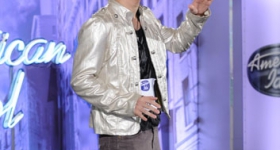A recap: Popmatters' Michael Landweber pointed out that Glee, while
having one of the most diverse casts on television, relegates all the
people of color to the background. Hyphen's
Sylvie Kim responded with, in my view, unwarranted dismissiveness. She
questioned his tactic of attacking just one show, instead of "a larger
systemic problem of underrepresentation of people of color and LGBTQ
and differently-abled folks." She accuses him of "suggesting that once they have equal billing, that shazam, everything's fine. That racism is simply a matter of under-representation." She then sets up a straw man argument (that Landweber didn't make) strongly implying that he expected the show to have parity in numbers of POC represented, and that he called for the show to counter stereotypes actively.
Let me protest immediately here: He most categorically did not
state or imply that if Glee gave POC characters equal billing, racism
would disappear. He never suggested that the characters in Glee were being portrayed stereotypically. He never asked Glee to counter stereotypes, either. Landweber actually made a very simple, straightforward
argument: that this particular show, at this particular
time, is disappointing, because it has a diverse cast but focuses on
the white characters. That argument is hard to dispute, if you watch
the show ... and Kim doesn't actually dispute it.
But I'm saying that all antiracist efforts -- Hyphen magazine and blog
included -- pay attention to and comment on the generality, and
specific instances, of media imbalance. We all do it because we are all
aware of the enormous impact media portrayals of race have on how we
understand real life. In fact the website Landweber was writing for --
Popmatters -- named itself after the concept that popular culture, you
know, matters. To expect Landweber to proceed with any other view is disingenuous at best.
And
while the news is high impact and so are reality shows, fictional
narrative has the most impact of all, if for no other reason than that
we get more of fictional narrative in our lives than any other kind. If
the average American watches 6 hours
of TV a day, and we suppose they watch news, sports, and reality TV, that leaves maybe 3.5 hours of
fictional stories entering your head per day. Let's say: a sitcom and
three dramas. Conservatively, not including movies, books, games, and
other Internet phenomena, the average American is getting 1,460
fictional stories put into their heads per year.
And most of
these stories feature predominantly white characters. Because fictional
narrative is the easiest to manipulate, it's easy to depict
white-dominated communities, even in places where there aren't any. And
because we consume so much fictional narrative and are so well trained
in it, it's easy for us to believe any fiction that's properly
structured and presented. So yes, constantly analyzing the fictions
we're subjected to as a culture is incredibly important to
antiracism. We can't effectively address structural racism with our
hands, when this poison is going into our eyes and ears at all hours.
Cultural criticism of specific television shows help their viewers to
watch with a more critical eye, and to deconstruct false and racist
narratives when they encounter them.
Sylvie Kim knows this. A lot of her posts on Hyphen blog have been about pop culture. And she's not the only one. Among the gajillion racially pointed analyses of specific television shows all
over the internet, half a squillion of those are on the Hyphen blog. Let me turn Sylvie's question back onto her: why attack this
commenter, whose analysis is essentially on the money? Why not the
other gajillion, many of whom have expressed themselves more awkwardly,
and less thoughtfully? Is it because he's a white commenter on a prominent blog?
I think we get to the heart of Sylvie's objections here:
It's insulting to people who actually suffer from a racist
system to complain about why your guilty pleasure of a show is making
you feel kind of icky inside. ... His
heart is in the right place, but his delivery is all awash in liberal
guilt and indignation. I never want to alienate white allies in what is
an eternal fight
against racism, but sometimes you just need to say, "Hey Mikey. Slow
your post-racial roll." ... Glee is a show that I like that I think could do better. But I
don't bandy around the "R" word too cavalierly. And I'm a minority,
damn it. So maybe Michael Landweber should think a little bit more
before calling people people a little bit racist. We all should.
Because when we use it without thinking, we start to chip away at the
seriousness of racism in all its forms.
Ai Ya. I appreciate the argument that the word "racist" gets used too often ... but "I'm a minority, damn it?" Really?
It's
hard for me not to see racial rank-pulling in this message. I've
seen this attitude all over the antiracist blogosphere: bloggers of
color "correcting" white bloggers, who can't possibly understand the
concepts of racism well enough to apply them. Hell, I've done it
myself, more than once. And sometimes it's necessary to take issue with
what another blogger writes about race, if you really feel they're
getting it wrong. This is what we call "dialogue."
But
the
moment a POC blogger sets up a straw man and then starts mentioning her
and her white "opponent's" relative races, you know you're in trouble.
Landweber's race shouldn't be relevant to whether or not his analysis
was right. Kim's race shouldn't be relevant to her chastising him.
And it's a little too easy to ascribe "white guilt" to any white person
who tries to redress any kind of racial ill. Short of them writing "I
feel guilty," you just don't know if they really feel guilt or not, and it's none of your business. All professions of "never wanting to alienate white allies" aside,
that's pretty much what Kim's doing here: doing recklessly, with little
regard for what's right.
There's been much idiocy around the question of whether Obama's presidency means we're "post-racial" or not. Clearly, we're not. One thing it can
mean, however, is that people of color start getting a place (or two)
at the mainstream table (which is another process we've been tracking
on Hyphen blog.) The other side of this is giving up the stranglehold
POC antiracists have on the racial discourse. We've been talking about
this stuff for decades. Is it really so threatening when some white
people prove that they've been listening?









Comments